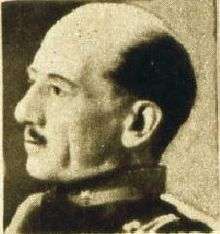Egon Brecher
| Egon Brecher | |
|---|---|
 Egon Brecher | |
| Born |
18 February 1880 Olmütz, Austria-Hungary (present-day Olomouc, Czech Republic) |
| Died |
12 October 1946 (aged 66) Hollywood, California, U.S. |
| Resting place | Hollywood Forever Cemetery |
| Occupation | Actor |
| Years active | 1903–1946 |
Egon Brecher (18 February 1880 – 12 August 1946) was an Austria-Hungary-born actor and director, who also served as the chief director of Vienna's Stadts Theatre, before entering the motion picture industry.
Career
The son of a professor, Brecher began studying philosophy in 1900 at the University of Heidelberg in Germany. He did not finish his studies, deciding to become an actor. He appeared on several provincial stages in Germany and Austria until 1910, and then played in Vienna on various occasions, directed by Josef Jarno until 1921.
In 1907, he founded an initiative (which lasted for something like one or two years) to play modern Yiddish theatre in German language with Siegfried Schmitz and members of the student club ‘Theodor Herzl’ like Hugo Zuckermann and Oskar Rosenfeld. In 1919 he was co-founder of the Freie Jüdische Volksbühne in Vienna, a Yiddish theatre, which existed for three years.
Then, in 1921, he moved to New York to act on Broadway. He moved to Hollywood in the late 1920s to appear in foreign-language versions of American films. In the mid-1930s he appeared in classic horror films The Black Cat, Werewolf of London, The Black Room, Mark of the Vampire and The Devil-Doll, and worked steadily in the espionage films of the 1930s/40s, his Slavic accent landing him roles both noble and villainous. One of his largest screen roles was in 1946's So Dark the Night.[1] He died later in 1946, aged 66, of a heart attack in Los Angeles, California.[1]
Partial filmography
- The Spendthrift (1917)
- The Royal Box (1929)
- To the Last Man (1933)
- The Black Cat (1934)
- Many Happy Returns (1934)
- Mark of the Vampire (1935) (uncredited)
- The Florentine Dagger (1935)
- Black Fury (1935)
- Werewolf of London (1935) (uncredited)
- The Black Room (1935) (uncredited)
- Charlie Chan's Secret (1936)
- Boulder Dam (1936)
- Till We Meet Again (1936)
- Sins of Man (1936)
- The White Angel (1936)
- The Devil-Doll (1936) (uncredited)
- Alibi for Murder (1936)
- Ladies in Love (1936)
- Black Legion (1937)
- Stolen Holiday (1937)
- Espionage (1937)
- I Met Him in Paris (1937)
- Thin Ice (1937)
- Heidi (1937)
- Black Legion (1937) as Old Man Dombrowski
- The Spy Ring (1938)
- Invisible Enemy (1938)
- You and Me (1938)
- Suez (1938)
- Devil's Island (1939) as Debriac
- The Three Musketeers (1939)
- The Angels Wash Their Faces (1939)
- Espionage Agent (1939)
- Judge Hardy and Son (1939)
- I Was an Adventuress (1940)
- Four Sons (1940) as Richter
- The Man I Married (1940)
- Man Hunt (1941)
- Underground (1941)
- They Dare Not Love (1941)
- Manpower (1941)
- Kings Row (1942)
- Isle of Missing Men (1942)
- The Purple V (1943)
- A Royal Scandal (1945)
- White Pongo (1945)
- O.S.S. (1946)
- So Dark the Night (1946)
Literature
- Brigitte Dalinger: Verloschene Sterne. Geschichte des jüdischen Theaters in Wien. (History of Jewish theatre in Vienna) Picus Verlag, Wien 1998, pp. 65, 198
References
- 1 2 Egon Brecher at the Internet Movie Database
External links
| Wikimedia Commons has media related to Egon Brecher. |
- Egon Brecher at the Internet Broadway Database

- Egon Brecher at AllMovie
- Egon Brecher at Find a Grave